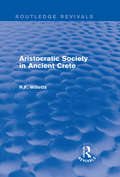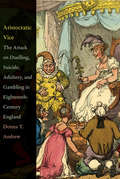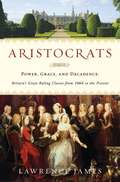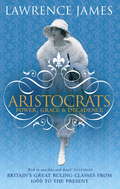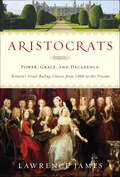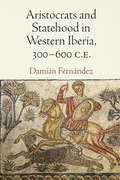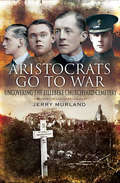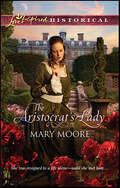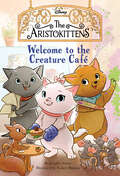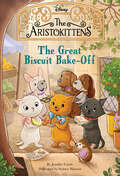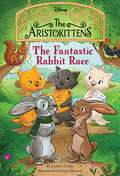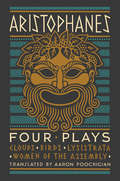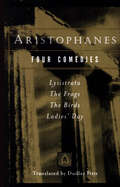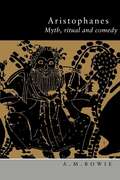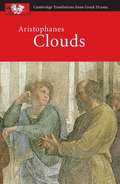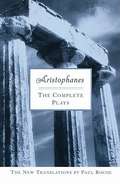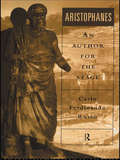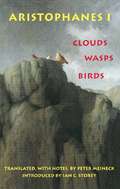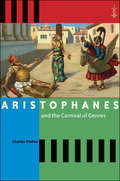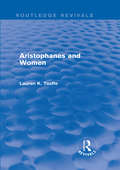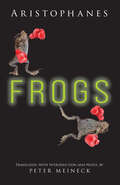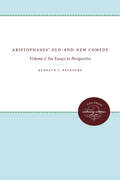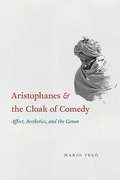- Table View
- List View
Aristocratic Society in Ancient Crete (Routledge Revivals)
by R. F. WillettsAristocratic Society in Ancient Crete, first published in 1955, investigates the emergence and progress of Dorian society on Crete from the 8th century BC onwards. The major contribution of Cretan culture in this period was in the field of law – law and order are traditionally linked, and Dorian Crete remained steadfast in its pursuit of order. The author offers an explanation for the protracted aristocratic character of Cretan society, basing his study on the crucial Code of Gortyna. The primitive foundations of the social system are examined, illuminating the tribal institutions which formed the basis of the aristocratic states which developed. The four classes of the Cretan states, and the mutual relations of these classes, are defined, and the stages whereby family institutions developed are analysed. Finally, political and judicial organisation is scrutinised, and the Cretan culture is situated in the wider horizon of Mediterranean civilisation.
Aristocratic Vice
by Donna T. AndrewAristocratic Vice examines the outrage against--and attempts to end--the four vices associated with the aristocracy in eighteenth-century England: duelling, suicide, adultery, and gambling. Each of the four, it was commonly believed, owed its origin to pride. Many felt the law did not go far enough to punish those perpetrators who were members of the elite. In this exciting new book, Andrew explores each vice's treatment by the press at the time and shows how a century of public attacks on aristocratic vices promoted a sense of "class superiority" among the soon-to-emerge British middle class."Donna Andrew continues to illuminate the mental landscapes of eighteenth-century Britain. . . . No historian of the period has made greater or more effective use of the newspaper press as a source for cultural history than she. This book is evidently the product of a great deal of work and is likely to stimulate further work."--Joanna Innes, University of Oxford
Aristocrats: Britain's Great Ruling Classes from 1066 to the Present
by Lawrence JamesThis is a history of the British aristocracy and their now almost vanished supremacy. It explains how and why a tiny elite exercised such a vast and pervasive influence over the course of our history.
Aristocrats: Power, Grace and Decadence - Britains Great Ruling Classes from 1066 to the Present
by Lawrence JamesFor nine hundred years the British aristocracy has considered itself ideally qualified to rule others, make laws and guide the fortunes of the nation. Tracing the history of this remarkable supremacy, ARISTOCRATS is a story of wars, intrigue, chicanery and extremes of both selflessness and greed. James also illuminates how the aristocracy's infatuation with classical art has forged our heritage, how its love of sport has shaped our pastimes and values - and how its scandals have entertained the public. Impeccably researched, balanced and brilliantly entertaining, ARISTOCRATS is an enthralling history of power, influence and an extraordinary knack for survival.
Aristocrats: Power, Grace, and Decadence
by Lawrence JamesAristocracy means "rule by the best." For nine hundred years, the British aristocracy considered itself ideally qualified to rule others, make laws, and guide the nation. Its virtues lay in its collective wisdom, its attachment to chivalric codes, and its sense of public duty. It evolved from a medieval warrior caste into a self-assured and sophisticated elite, which made itself the champion of popular liberty: It forced King John to sign the Magna Carta and later used its power and wealth to depose a succession of tyrannical kings from Richard II to James II. Britain's liberties and constitution were the result of aristocratic bloody-mindedness and courage.Aristocrats traces the history of this remarkable supremacy. It is a story of civil wars, conquests, intrigue, chicanery, and extremes of selflessness and greed. The aristocracy survived and, in the age of the great house and the Grand Tour, governed the first industrial nation while a knot of noblemen ruled its growing empire. Under pressure from below, this political power was slowly relinquished and then shared. Yet democratic Britain retained its aristocracy: Churchill, himself the grandson of a duke, presided over a wartime cabinet that contained six hereditary peers.Lawrence James illuminates the culture of this singular caste, shows how its infatuation with classical art has forged England's heritage, how its love of sport has shaped the nation's pastimes and values, and how its scandals have entertained its public.Impeccably researched, balanced, and brilliantly told, Aristocrats is an enthralling story of survival, a stunning history of wealth, power, and influence.
Aristocrats and Statehood in Western Iberia, 300-600 C.E. (Empire and After)
by Damián FernándezIn a distant corner of the late antique world, along the Atlantic river valleys of western Iberia, local elite populations lived through the ebb and flow of empire and kingdoms as historical agents with their own social strategies. Contrary to earlier historiographical accounts, these aristocrats were not oppressed by a centralized Roman empire or its successor kingdoms; nor was there an inherent conflict between central states and local elites. Instead, Damián Fernández argues, there was an interdependency of state and local aristocracies. The upper classes embraced state projects to assert their ascendancy within their communities. By doing so, they enacted statehood at the local level, bringing state presence to the remotest corners of Iberia, both under Roman rule and during the later Suevic and Visigothic kingdoms.Aristocrats and Statehood in Western Iberia, 300-600 C.E. combines archaeological and literary sources to reconstruct the history of late antique Iberian aristocracies, facilitating the study of a social class that has proved elusive when approached through the lens of a single type of evidence. This is the first study of Iberian elites that covers both the late Roman and the post-Roman periods in similar depth, and the chronological approach allows for a new perspective on social agency of late antique nobility. While the end of the Roman empire changed the political, economic, and social strategies of local aristocrats, the book also demonstrates a considerable degree of continuity that lasted until the late sixth century.
Aristocrats Go to War: Uncovering the Zillebeke Cemetery
by Jerry MurlandZillebekes small churchyard military cemetery provides the inspiration for this charming piece of military and social history. The author has researched into the exploits and backgrounds of 27 fallen soldiers, the majority being officers of the Guards and Cavalry, as well as other ranks and six Canadians.The outcome is a fascinating and moving book that emphasizes the indiscriminate nature of war. Privilege and wealth were no protection against bullets and shells and all men regardless of background took their chances, standing shoulder to shoulder. The 1st Battle of Ypres in late 1914 was in many ways the last stand of Britains Contemptible Little Army (as the Kaiser called it) and the Ypres Salient was to remain the focus of so much fighting over the next four years.Thanks to detailed research and support from the families concerned, the author has unearthed letters, memorabilia and photographs.
The Aristocrat's Lady
by Mary MooreAn Unexpected EncounterFor a few moments on a moonlit balcony, Nicole Beaumont was just a beautiful woman catching the eye of the handsome Lord Devlin-but she knew the illusion couldn't last. If the enigmatic aristocrat knew her secret, he'd realize that her disability left her unfit for love. So who could blame her for hiding the truth a little longer?Devlin had never met a woman like Nicole. Her unique combination of innocence and wisdom left him utterly intrigued. Yet what was she hiding? For a man who did not trust easily, discovering her secret was devastating. Overcoming their pasts and forging a future would take faith, forgiveness and trust. And second chances could lead to new beginnings...
The Aristokittens #1: Welcome to the Creature Café (The Aristokittens)
by Jennifer CastleFor fans of Unicorn Princesses and Purrmaids, this illustrated chapter book series follows kittens Marie, Berlioz, and Toulouse from Disney's The Aristocats as they embark on their next adventure--opening a Parisian critter c afé! Meet the Aristokittens, a trio of siblings with big (and delicious) plans! One day, while chasing each other through the streets of Paris, Marie, Berlioz, and Toulouse uncover an abandoned café made just for animals. After hearing stories of the café's wondrous past, the kittens decide to reopen the place themselves. But the trio can't agree on the menu, music, and decorations. With opening day creeping closer, can the kittens avoid a total catastrophe and create the purrfect recipe for success? Filled with mystery, humor, and friendship, each book in the Aristokittens series expands the world of Disney's The Aristocats through the eyes of its iconic kitten trio . . . and is the perfect recipe for fun! Don't miss the Aristokittens' next adventure: * The Great Biscuit Bake-Off
The Aristokittens #2: The Great Biscuit BakeOff (The Aristokittens)
by Jennifer CastleFor fans of Unicorn Princesses and Purrmaids, this illustrated chapter book series follows kittens Marie, Berlioz, and Toulouse from Disney's The Aristocats as they embark on their next adventure--opening a Parisian critter c afé! Meet the Aristokittens, a trio of siblings with big (and delicious) plans! After meeting three new puppy friends, kittens Marie, Berlioz, and Toulouse have a wonderful idea: they'll host a Dog Biscuit Bake-Off at their café! Toulouse can't wait to enter and prove that he's more than just the café's artist. But the competition gets hairy, fast, when he and Marie join rival teams--and Berlioz is caught in the middle. Will the Bake-Off be a grand success, or a doggone disaster? Filled with mystery, humor, and friendship, each book in the Aristokittens series expands the world of Disney's The Aristocats through the eyes of its iconic kitten trio . . . and is the perfect recipe for fun! Don't miss the Aristokittens' first adventure: * Welcome to the Creature Café
The Aristokittens #3: The Fantastic Rabbit Race
by Jennifer CastleDisney magic meets adorable kittens in this illustrated chapter book series that stars Marie, Berlioz, and Toulouse from The Aristocats on a new adventure--running their own creature cafe! When the annual Fantastic Rabbit Race kicks off in Paris's Luxembourg Gardens, Marie, Berlioz, and Toulouse's secret cafe for animals becomes busier than ever! Berlioz notices that talented but awkward new racer Angelique isn't quite fitting in with her fellow contestants, so he decides to cheer her on--but he's disappointed when Marie and Toulouse keep their distance, worried about "playing favorites." Things get even stranger when another racer, Skip Hopper, shows up and starts acting very oddly. . . Can the kittens work together to make sure the race is fair--and that the cafe feels like a welcoming place for all? Filled with mystery, fun, and friendship, each book in the Aristokittens series expands the world of Disney's The Aristocats through the eyes of its iconic kitten trio--and is the perfect recipe for fun! Read the whole Aristokittens series! * Welcome to the Creature Cafe * The Great Biscuit Bake-Off
Aristophanes: Clouds, Birds, Lysistrata, Women Of The Assembly
by AristophanesCapturing the antic outrageousness and lyrical brilliance of antiquity’s greatest comedies, Aaron Poochigian’s Aristophanes: Four Plays brings these classic dramas to vivid life for a twenty-first century audience. The citizens of ancient Athens enjoyed a freedom of speech as broad as our own. This freedom, parrhesia, the right to say what one pleased, how and when one pleased, and to whom, had no more fervent champion than the brilliant fifth-century comic playwright Aristophanes. His plays, immensely popular with the Athenian public, were frequently crude, even obscene. He ridiculed the great and the good of the city, showing up their hypocrisy and arrogance in ways that went far beyond the standards of good taste, securing the ire (and sometimes the retaliation) of his powerful targets. He showed his contemporaries, and he teaches us now, that when those in power act obscenely, patriotic obscenity is a fitting response. Aristophanes’s satirical masterpieces were also surpassingly virtuosic works of poetry. The metrical variety of his plays has always thrilled readers who can access the original Greek, but until now, English translations have failed to capture their lyrical genius. Aaron Poochigian, the first poet-classicist to tackle these plays in a generation, brings back to life four of Aristophanes’s most entertaining, wickedly crude, and frequently beautiful lyric comedies—the pinnacle of his comic art: · Clouds, a play famous for its caricature of antiquity’s greatest philosopher, Socrates; · Lysistrata, in which a woman convinces her female compatriots to withhold sex from their warmongering lovers unless they negotiate peace; · Birds, in which feathered creatures build a great city and become like gods; · and Women of the Assembly, Aristophones’s most revolutionary play, which inverts the norms of gender and power. Poochigian’s new rendering of these comic masterpieces finally gives contemporary readers a sense of the subversive pleasure Aristophones’s original audiences felt when they were first performed on the Athenian stage.
Aristophanes: Four Comedies
by AristophanesNew English versions of Lysistrata, The Frogs, The Birds, and Ladies' Day. "Thanks to Dudley Fitts...we can appreciate Aristophanes' vigor, his robust style, his scorching wit, his earthy humor, his devotion to honesty and his poetic imagination" (Brooks Atkinson, New York Times). Index.
Aristophanes: Myth, Ritual and Comedy
by A. M. BowieThis book examines the plays of the Greek comic writer Aristophanes and attempts to reconstruct the responses of the original audiences by using anthropological techniques to compare the plays with those Greek myths and rituals that share similar story patterns or subject matter. It is the first book to apply this type of analysis systematically to all the comedies, and also differs from earlier studies in that it does not impose a single interpretative structure on the plays. All Greek is translated.
Aristophanes: Clouds
by John Claughton Judith Affleck AristophanesTreating ancient plays as living drama. Classical Greek drama is brought vividly to life in this series of new translations. <P><P>Students are encouraged to engage with the text through detailed commentaries, including suggestions for discussion and analysis. In addition, numerous practical questions stimulate ideas on staging and encourage students to explore the play's dramatic qualities. <P>Clouds is suitable for students of both Classical Civilisation and Drama. Useful features include full synopsis of the play, commentary alongside translation for easy reference and a comprehensive introduction to the Greek Theatre. <P>Clouds is aimed primarily at A-level and undergraduate students in the UK, and college students in North America.<P> Designed for both study and performance, the translations remain faithful to the original Greek, yet have the immediacy of contemporary English.<P> Detailed commentary alongside the translation makes it easy for students to reference and follow, without interrupting their reading of the play.<P> A full synopsis of the play and background information to the story supports students studying a range of plays.<P> A comprehensive introduction to Greek theatre and a guide to the pronunciation of names supports readers and students with no previous knowledge of Greek drama.<P> Activities and suggestions for discussion and analysis allow easy access to the play and enhance reading.<P> Useful notes and questions encourage discussion on the themes and dramatic qualities of the text, and the more practical issues of staging and performance.
Aristophanes: The Complete Plays
by Paul RocheA brand-new translation of the world's greatest satirist.With a signature style that is at once bawdy and delicate, as well as a fearless penchant for lampooning the rich and powerful, Aristophanes remains arguably the finest satirist of all time. Collected here are all 11 of his surviving plays-newly translated by the distinguished poet and translator Paul Roche.
Aristophanes: An Author for the Stage
by Carlo Ferdinando RussoCarlo Ferdinando Russo's book has been a seminal work on Aristophanes since its publication in Italy in 1962. In his detailed analysis, Russo considers the plays as libretti for actors and singers rather than as mere texts, and never loses sight of the stage. This is the classic book about Aristophanes. Now finally available in English and much-updated, it is essential reading for any student of Athenian comedy.
Aristophanes 1: Clouds, Wasps, Birds
by Aristophanes Peter Meineck Ian C. StoreyOriginally adapted for the stage, Peter Meineck's revised translations achieve a level of fidelity appropriate for classroom use while managing to preserve the wit and energy that led The New Yorker to judge his CloudsThe best Greek drama we've ever seen anywhere," and The Times Literary Supplement to describe his Wasps as "Hugely enjoyable and very, very funny. A general Introduction, introductions to the plays, and detailed notes on staging, history, religious practice and myth combine to make this a remarkably useful teaching text.
Aristophanes, 2: Wasps, Lysistrata, Frogs, The Sexual Congress (Penn Greek Drama Ser.)
by David R. Slavitt Palmer Bovie Campbell McGrath X. J. Kennedy Alfred Corn R. H. W. DillardThe Penn Greek Drama Series presents original literary translations of the entire corpus of classical Greek drama: tragedies, comedies, and satyr plays. It is the only contemporary series of all the surviving work of Aeschylus, Sophocles, Euripides, Aristophanes, and Menander.
Aristophanes and the Carnival of Genres (Arethusa Books)
by Charles PlatterThe comedies of Aristophanes are known not only for their boldly imaginative plots but for the ways in which they incorporate and orchestrate a wide variety of literary genres and speech styles. Unlike the writers of tragedy, who prefer a uniformly elevated tone, Aristophanes articulates his dramatic dialogue with striking literary and linguistic juxtapositions, producing a carnivalesque medley of genres that continually forces both audience and reader to readjust their perspectives. In this energetic and original study, Charles Platter interprets the complexities of Aristophanes' work through the lens of Mikhail Bakhtin's critical writing.This book charts a new course for Aristophanic comedy, taking its lead from the work of Bakhtin. Bakhtin describes the way multiple voices—vocabularies, tones, and styles of language originating in different social classes and contexts—appear and interact within literary texts. He argues that the dynamic quality of literature arises from the dialogic relations that exist among these voices. Although Bakhtin applied his theory primarily to the epic and the novel, Platter finds in his work profound implications for Aristophanic comedy, where stylistic heterogeneity is the genre's lifeblood.
Aristophanes and the Poetics of Competition
by Zachary P. BilesAthenian comic drama was written for performance at festivals honouring the god Dionysos. Through dramatic action and open discourse, poets sought to engage their rivals and impress the audience, all in an effort to obtain victory in the competitions. This book uses that competitive performance context as an interpretive framework within which to understand the thematic interests shaping the plots and poetic quality of Aristophanes' plays in particular, and of Old Comedy in general. Studying five individual plays from the Aristophanic corpus as well as fragments of other comic poets, it reveals the competitive poetics distinctive to each. It also traces thematic connections with other poetic traditions, especially epic, lyric, and tragedy, and thereby seeks to place competitive poetics within broader trends in Greek literature.
Aristophanes and Women (Routledge Revivals)
by Lauren TaaffeAristophanes and Women, first published in 1993, investigates the workings of the great Athenian comedian’s ‘women plays’ in an attempt to discern why they were in fact probably quite funny to their original audiences. It is argued that modern students, scholars, and dramatists need to consider much more closely the conditions of the plays’ ancient productions when evaluating their ostensible themes. Three plays are focused upon: Lysistrata, Thesmophoriazusae, and Ecclesiazusae. All seem to speak quite eloquently to contemporary concerns about women’s rights, the value of women’s work, and the relationships between women and war, literary representation and politics. On the one hand, Professor Taaffe tries to retrieve what an ancient Athenian audience may have l appreciated about these plays and what their central theses may have meant within that culture. On the other hand, Aristophanes is discussed from the perspective of a late twentieth-century, specifically female, reader.
Aristophanes: Frogs
by AristophanesAristophanes's classic send-up of rivalry within the ultra-competitive world of fifth-century Athenian theatre wins a new lease on life in this fresh line-for-line translation by Peter Meineck. Premiered in 2021 by Aquila Theatre and accompanied here by Meineck&’s notes and wide-ranging Introduction, this Frogs offers the best view yet of a high-stakes afterlife contest between two of Athens's late great playwrights. Both are undisputed masters of tragedy. But only one can win and return to save the city.
Aristophanes' Old-and-New Comedy: Volume I: Six Essays in Perspective
by Kenneth J. ReckfordThis startling and original study emerged from Kenneth Rockford's wish to vindicate Aristophanes' Clouds against detractors. As a result of years of rereading and teaching Aristophanes, he realized that the Clouds could not be defended in an analysis of that play in isolation. A better approach, he decided, would be to define a comic perspective within which Aristophanes' comedies in general as well as the Clouds in particular could be appreciated.This first volume of Reckford's defense examines the comedies as a whole in a series of defining essays, each with its own dominant concern and method of approach. The author begins by exploring not the usual questions of Aristophanes' political attitudes and his place in the development of comedy, but rather the festive, celebratory, and Dionysian nature of Old Comedy. Here and throughout the book Reckford illustrates Aristophanes' form of comedy with analogies to Rabelais, Shakespeare, Charlie Chaplin, Alice in Wonderland, and The Wonderful Wizard of Oz.In the remaining essays Reckford goes beyond the usual Freudian approaches, reinterpreting the comic catharsis as a clarification of wishing and hoping. He also explores the growth of plays from comic idea to comic performance, in ways reflected in Tom Stoppard's plays today. Only then are Aristophanes' basic political loyalties described, as well as the place of his old- and-new comedy within the history of the genre.In a book that is as much about comedy generally as it is about Aristophanes specifically, some plays are treated more fully than others. Reckford discusses the Wasps at length, comparing the symbolic transformations and comic recognitions in the play with dream experience and dream interpretation. He also analyzes the Peace, the Acharians, the Birds, and the Frogs. Reckford's vindication of the Clouds will appear in the second volume of his defense, Clouds of Glory.Reckford's playful translations preserve the puns and anachronisms of Aristophanes, maintaining the playwright's comic feeling and tone. Combining traditional classical scholarship with a variety of literary, psychological, and anthropological approaches, he has written a study that will appeal to both the academic audience and the general reader who cares about comedy.Originally published in 1987.A UNC Press Enduring Edition -- UNC Press Enduring Editions use the latest in digital technology to make available again books from our distinguished backlist that were previously out of print. These editions are published unaltered from the original, and are presented in affordable paperback formats, bringing readers both historical and cultural value.
Aristophanes & the Cloak of Comedy: Affect, Aesthetics, and the Canon
by Mario TelòThe Greek playwright Aristophanes (active 427–386 BCE) is often portrayed as the poet who brought stability, discipline, and sophistication to the rowdy theatrical genre of Old Comedy. In this groundbreaking book, situated within the affective turn in the humanities, Mario Telò explores a vital yet understudied question: how did this view of Aristophanes arise, and why did his popularity eventually eclipse that of his rivals? Telò boldly traces Aristophanes’s rise, ironically, to the defeat of his play Clouds at the Great Dionysia of 423 BCE. Close readings of his revised Clouds and other works, such as Wasps, uncover references to the earlier Clouds, presented by Aristophanes as his failed attempt to heal the audience, who are reflected in the plays as a kind of dysfunctional father. In this proto-canonical narrative of failure, grounded in the distinctive feelings of different comic modes, Aristophanic comedy becomes cast as a prestigious object, a soft, protective cloak meant to shield viewers from the debilitating effects of competitors’ comedies and restore a sense of paternal responsibility and authority. Associations between afflicted fathers and healing sons, between audience and poet, are shown to be at the center of the discourse that has shaped Aristophanes’s canonical dominance ever since.
